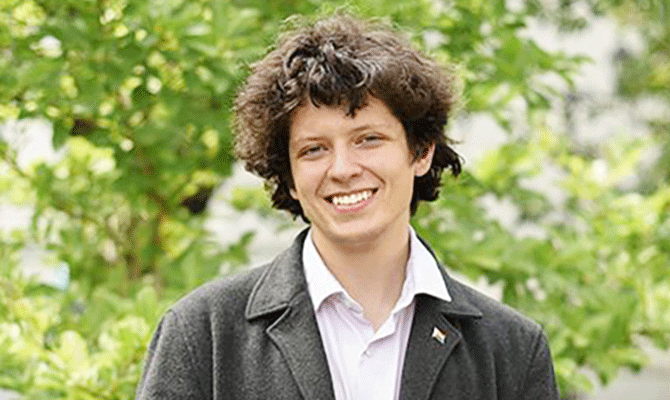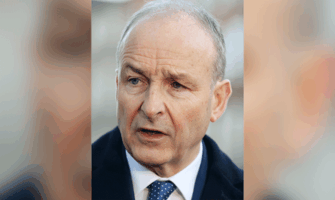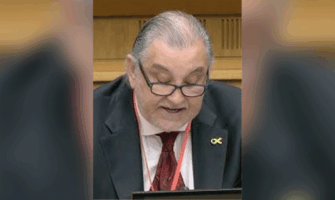
Seán Thim O’Leary
SEÁN THIM O’LEARY will lead Trinity College Dublin’s Student Union (TCDSU) into the 2025/26 academic year. The non-binary student from Wexford is former chair of the Trinity Social Democrats and previously worked as an intern for Fianna Fáil TD Malcolm Byrne (another SU hack) during his time in the Seanad. O’Leary joins fellow Wexican and vice chair of UCD’s Ógra FF wing Michael Roche (UCDSU president) as the union heads of two of Ireland’s most prestigious universities.
O’Leary is viewed as more of a technocrat than recent radical activist presidents László Molnárfi and Jenny Maguire. TCDSU has seen an increased profile in recent years, with successful campaigns such as the barricading of the Book of Kells and the Boycott, Divestment, Sanctions (BDS) encampment both yielding substantial results. Direct action was shown to work in Trinity when the union cut off the college’s access to the lifeblood that is tourist money. In June, TCD voted to fully divest from all Israeli institutions, making it one of the first universities in the West to do so.
Molnárfi and Maguire have maintained a level of relevance since leaving office. The former was one of the more high-profile comrades who founded Red Network, a Socialist Workers’ Party splinter group led by councillor Madeleine Johansson, who vows to fight “class war not culture war”. Maguire, meanwhile, is a frequent contributing writer to the Irish Independent.
O’Leary is certainly a change of pace, having been involved in the unsuccessful effort to impeach Molnárfi and the successful censure of Maguire for her involvement in the Trinity effigy scandal.
O’Leary beat out two other students and a late-surging Ron (re-open nominations) campaign for the SU role in February. The Ron campaign, which sought to have anyone but the initially presented candidates elected, had several criticisms including O’Leary’s lack of a cohesive vision for the union and outsized focus on lobbying as a tactic rather than direct action.
Ron clearly resonated with students and it led the voting until it was overtaken and defeated on the third count by O’Leary. O’Leary is well aware of their narrow margin of victory and acknowledged it in an acceptance speech in popular Dublin nightclub Lost Lane.
The official Ron campaign was the work of Molnárfi and Maguire followers, with campaign manager Amy Kennedy describing the group as “radical leftists”. But its appeal reached further than the left.
Freedom4Students (not to be confused with Molnárfi’s Students4Change), a group that is campaigning to allow students to opt out of currently mandatory TCDSU membership, attributed the success of Ron to wider student frustrations with the union rather than any ideological cause.
In third place in the race to become TCDSU president was Patrick Keegan, a US student of business and politics. He is chair of Trinity Ógra Shinn Féin and the former chair of Trinity BDS. Keegan failed to excite as a candidate and didn’t succeed in taking credit for the victories of BDS on campus over the year.
In last place was Giovanni (formerly Gavin) Li, a first-year diplo-brat studying languages. His manifesto included some more unique suggestions such as providing Japanese-style sleeping pods for students to use overnight on campus.
Candidates were especially restrained in their electioneering due to the union’s ban on negative campaigning, making it harder for them to directly criticise each other.
O’Leary’s victory could be seen as a move towards moderation after two years of radical representation but a more partisan explanation is possible too. The Soc Dems has been the most popular party on campus for five years running, winning the most recent annual poll conducted by Trinity News with 39% of the vote – comfortably clear of second-place Sinn Féin at 13% and People Before Profit at 12.9%.
O’Leary, however, could not bask in the glory of their narrow presidential victory for long as an unexpected scandal soon occurred.
In April TCDSU ran a sexual assault awareness campaign that employed some unorthodox tactics, including hanging a hooded effigy of a rapist outside the office of the junior dean (who deals with reports of sexual misconduct). SU welfare and equality officer Hamza Bana encouraged people to “do whatever they want with the body” including beating it with a pipe as it hung from its neck or ankles (depending on the effigy).
The demonstration was repeated outside the Hamilton building on Trinity’s campus – a centre for science students – because “historically STEM degrees are male dominant and are more likely to be perpetrators”, according to Bana.
Anonymous confessions regarding sexual assault were also gathered and posted outside the junior dean’s office. Those who wrote the confessions were not informed that they would be publicised.
A scrapped facet of the campaign proposed by Maguire at a TCDSU meeting was the printing of stickers saying “rapist” that people could then use to label those accused of sexual assault.
President-elect O’Leary was privy to the campaign as it was being organised and urged Maguire and Bana not to go ahead with the proposed protests. O’Leary and other union officers were misled, they later explained, and told that instead coloured smoke bombs would be used to highlight the issue of sexual assault.
O’Leary subsequently supported a petition to censure Maguire and Bana, which was eventually successful.
In March 2024, an attempt to censure Molnárfi over a different matter failed due to a mass walkout of his supporters preventing the council from taking a vote.
This show of solidarity was not present for Maguire or Bana, who were both censured by the council just a week after their controversial campaign. Luckily for them, a “censure” has zero effect other than granting the label of being “censured”. Thus, Maguire quietly carried out the end of her term as president, but not before voting through a motion at the last council meeting attempting to increase oversight on the SU-funded University Times. A referendum is set to be held this year that would allow the editor to be impeached and require them to present a report to council.
O’Leary was able to use the controversy surrounding the campaign to draw a clear contrast with the far-left, protest-focused ideology of the last two years. If April’s events are any guide, their presidency is set to be toned down in its rhetoric. O’Leary did not follow in the footsteps of former UCDSU president Martha Ní Ríada and national executive member in resigning from the Soc Dems after the re-admittance of former Palantir employee, TD Eoin Hayes, putting the new president on the less radical side of Palestinian solidarity and the Soc Dems.
The College of the Holy and Undivided Trinity of Queen Elizabeth is likely to be quieter over the next year but there is time yet for O’Leary to reveal a revolutionary streak in office.















